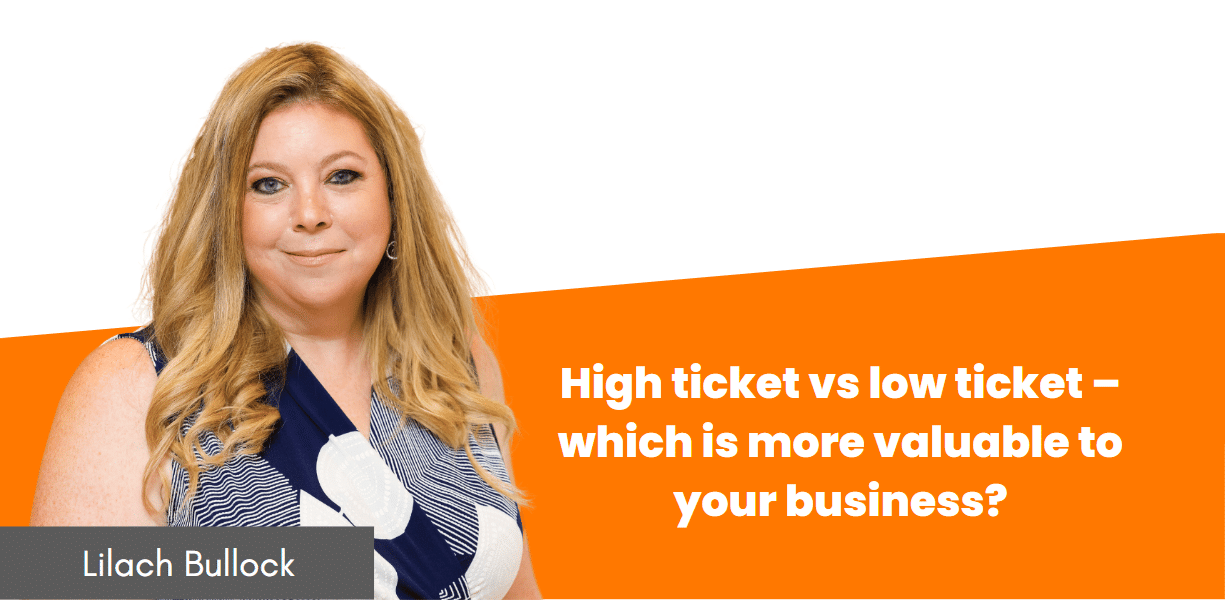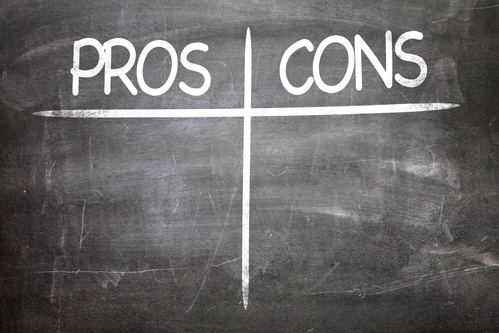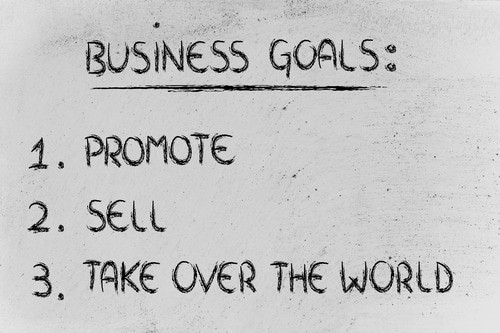Follow Lilach

High ticket vs low ticket – which is more valuable to your business?
Wondering what’s better between high-ticket sales and low ticket? Not sure what route to take for your own business?
If you operated an eCommerce store, or wanted to launch profitable online courses, would you rather your virtual shelves were stocked with dozens of low-cost items that are liable to attract impulse buys or a selection of high-cost items that will be purchased less frequently?
If you had to focus on one price bracket, what would you choose – high-ticket or low-ticket items?
All businesses and entrepreneurs want to make as much revenue as possible, but which method will actually deliver the best results?
In this blog post, I’m going to look at the merits of both high-ticket sales and low-ticket to find out which is more valuable to your business.

What are high-ticket and low-ticket items?
High-ticket vs. low-ticket items: the pros and cons
High-ticket vs. low-ticket items: the verdict
High ticket sales vs low ticket – which are more valuable to your business?
What are high-ticket and low-ticket items?
Most businesses, both online and bricks and mortar, usually sell a range of products or services.
Some of them are cheap, some are quite expensive and of course, there are all of those in between. Low-ticket products are your cheapest products on offer and high-ticket products, of course, are your most expensive.
And of course, there are those who mostly focus on a single type of product: high priced or low priced.
[sc_fs_multi_faq headline-0=”p” question-0=”What are high-ticket sales? ” answer-0=”High-ticket items are high-cost and luxury products that are sold for high prices. If you were a life coach, for example, a high-ticket could be a 1-1 mentoring workshop worth $2000, while a low-ticket item would be a short mentoring call worth $100. ” image-0=”” headline-1=”p” question-1=”What are low-ticket items? ” answer-1=”Low-ticket items are the cheap products you have on offer; for example, a $100 mentoring call if you were a coach or a $20 e-book you’re selling.” image-1=”” count=”2″ html=”true” css_class=””]
Which would you focus on selling more of? Would you rather focus on high ticket sales and sell expensive products/services or sell a larger amount of low-ticket items?
Let’s go through the two types of online products to find out what each one has to offer.
[clickToTweet tweet=”High ticket vs low ticket – which is more valuable to your #business? via @lilachbullock” quote=”High ticket vs low ticket – which is more valuable to your #business? via @lilachbullock”]
High-ticket sales vs low-ticket: the pros and cons
 Based on my own experience, high ticket items are the only way to truly build a scalable online business.
Based on my own experience, high ticket items are the only way to truly build a scalable online business.
In the battle of profit margin versus volume, more often than not the profit margin is the winner.
And when it comes to high-ticket sales, that’s the biggest draw: you can enjoy a huge profit margin as much as 10 times that of a low-ticket item, if not more.
The thing is, the cost of acquisition for leads is often the same for both high-ticket and low-ticket items.
With low-ticket items though, you’re only going to make a small profit from that lead, which means that you will need to sell a lot more products in order to achieve your goals.
Think about it this way: if it costs you £100 to acquire a lead and your low-ticket item is £150, that means you’ve made a profit of £50.
But if you sell a programme or product worth £1,000, you’re making £900 in profit.
If you were to make the same profit selling only low-ticket items, you would have to sell 18 products in order to make the same profit. That means 18 times more work and more hours spent finding leads, chasing leads and then trying to close those same leads.
It also means more frustration for you and a much smaller chance that you’ll be able to ultimately grow and scale your business.
[clickToTweet tweet=”High ticket vs low ticket – which is more valuable to your #business? via @lilachbullock” quote=”High ticket vs low ticket – which is more valuable to your #business? via @lilachbullock”]
Focusing on high-ticket sales can also mean less money spent on promoting your products.
If you want to make sales of £50k a year and you’re selling low-ticket products for £50, you would then need to sell 1,000 products to achieve your goal.
But if you focus on selling a high-ticket product or service priced at £1,000, that would mean you would only need to sell 50 items to achieve your yearly goal.
That means considerably less work for you and fewer expenses on promotional and marketing strategies like advertising.
 With low ticket items, you’ll need to constantly run ads and promote your products – after all, you’ll basically need to sell almost three products every day in order to achieve your goal.
With low ticket items, you’ll need to constantly run ads and promote your products – after all, you’ll basically need to sell almost three products every day in order to achieve your goal.
That’s not to say the high-ticket is always the winning strategy.
It certainly has its downsides, not least the fact that you’ll need to create a programme that is worth all of this money.
Not only that, but there also needs to be a market for it before you can attract clients who would benefit from your programme or product.
Although I’m firmly in favour of high-ticket items (and my clients know it, too – I always push them to go for high-ticket sales and then focus on them so that they can grow), that’s not to say that low-ticket sales are worthless.
Whether we’re talking about a small online business or a sprawling global corporation, I strongly believe that everyone should have some sort of low-ticket item on offer.
There’s a big reason for this: low-ticket items help you get more people into your sales funnel.
These impulse buys and pressure-free purchases get them hooked and give them a taste for the full-fat version – get them in your the high-ticket sales funnel so that you can later upsell to them.
Later, when they have more disposable income or are ready to take the next step, they’re more likely to come back and buy a high-ticket item from you.
The thing is, most people won’t be ready to buy something very expensive from a business they don’t really know.
High-ticket items are big investments, so if you want people to buy them, you need to first hook them somehow and then build on their trust.
One of the best ways to achieve this is to first sell them low-ticket items and from there nurture the relationship until they’re ready to make a bigger investment.
That being said, low-ticket items are simply not enough to build a scalable business.
You should only look at your low-ticket items as a gateway to people buying your high-ticket items: a way to build a high ticket sales funnel that ultimately results in them buying a more expensive product/service.
That’s not to say that it’s impossible to make money with low-ticket items, but the only way to make a respectable profit with these types of products is if you have a huge list that you can sell to and high levels of web traffic that converts well.
If you don’t have a big list you will need to invest too much in acquiring clients and your profit margin will drop even more.
[clickToTweet tweet=”High ticket vs low ticket – which is more valuable to your #business? via @lilachbullock” quote=”High ticket vs low ticket – which is more valuable to your #business? via @lilachbullock”]
So which is best?
As you’ll have gathered by now, I wholeheartedly believe that focusing on high-ticket sales is the path to success.
I’ve learned this repeatedly with my own businesses as well as with all of the other entrepreneurs and SMEs I’ve coached and mentored over the years.
I talk to a lot of entrepreneurs and small web-based businesses and the one thing the most successful ones have in common is that they all focus on high ticket sales – every single one of them.
Conclusion: High ticket sales vs low ticket
Both low-ticket and high-ticket items have their importance, no matter what business or industry you are in.
Each serves its own role in developing a healthy, flourishing business, but at the end of the day, if you want to build a scalable business, high-ticket products and services are invariably the best way to go.
You’ll make more of a profit in less time, you’ll spend less money on advertising and less time on closing deals. If you want to go big, you have to go high.
Whatever you’re selling – be it high value, low value or somewhere in between – I can help you increase your volume and generate significant revenue. Click here to book a free consultation.

Follow Lilach















